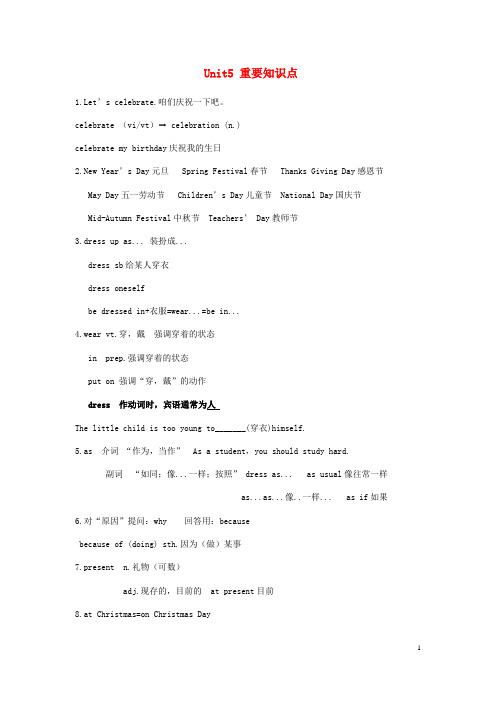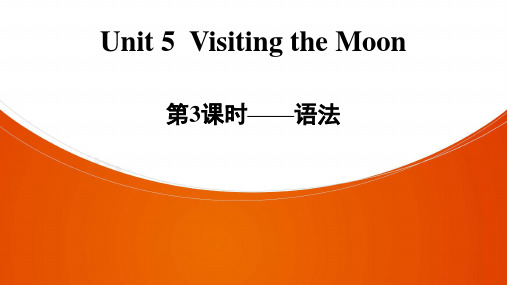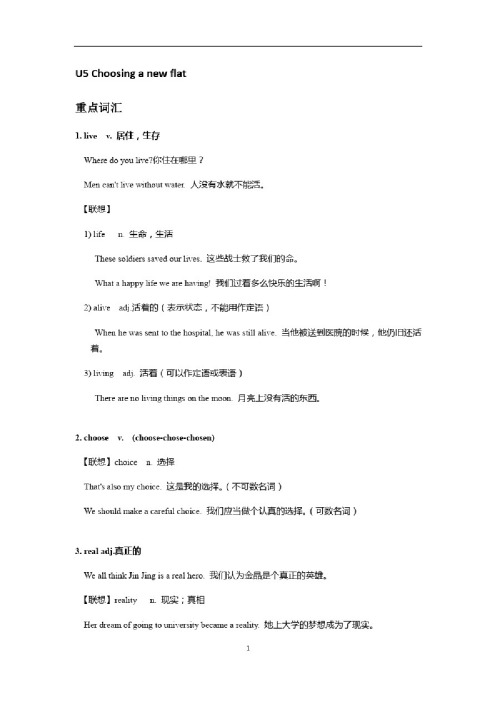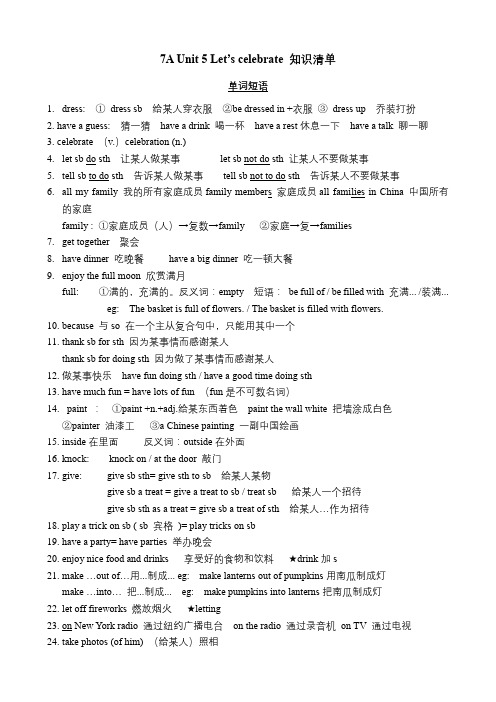初一上册英语第五单元语法知识点(牛津新版)
Unit5重点语法梳理牛津译林版英语七年级上册

常州市20232024年牛津译林版7AU5重点语法梳理1. 你有些时间吗?我有很多问题想问你。
Do you have time for me now ?I have a lot of questions to ask you.名词问题question/难题problem动词用法问某人某事ask somebody something叫某人做某事ask somebody to do something有时间做某事have time to do something2.作为圣诞节礼物,你还想要其他什么吗?What else would you like to get as a Christmas present?名词礼物present/同义词gift动词用法想要做某事Would like to do something其他的else放在特殊疑问词的后面后面不可以加名词其他什么what else3. 他擅长数学和英语,但是他不擅长其他学科。
He does well in Maths and English but he isn't good at some other subjects.其他的学科—形容词修饰名词other subjectsother+名词复数词组一个…另一个one …the other…两者之一别人others +名词,后面不可以再加名词了another 三者及三者以上的另一个,后面+名词单数4. 通常我的家人去我的爷爷奶奶那儿去看他们,在周六的下午。
Usually my family go to my grandparents’to visit them on Saturday afternoons.这里指的是爷爷奶奶的地方去某地go to someplace5. 北方人喜欢在春节吃饺子。
People in the north of China like eating dumplings at the Spring Festival.饺子dumpling名词体现单复数词组吃饺子eat dumplings粽子rice dumplings词组在中国的北方in the north of China/在中国的南方in the south of China/在中国的东方in the east of China/在中国的西方in the west of China注意东南西北的方位名词表达我的父母是办公室职员。
上海牛津版 七年级上册 英语unit5语法

上海牛津版七年级上册英语unit5语法:一般将来时一、知识点Unit5课文句子翻译:1、Tomorrow I’ll be one of the first students to travel into space.2、The spaceship will leave the earth at9a.m.3、So it’ll take us about four days to get there.4、So we’ll all be able to float around in the spaceship.5、We’ll have tie ourselves to our beds so that we won’t float away in our sleep.6、Without gravity,our bodies may get weak,so we’ll have to do exercises every day.7、When we arrive,I’m going to walk on the moon.Unit5语法:一般将来时一、概念:表示将要发生的动作或存在的状态及打算、计划或准备做某事。
句中一般有以下时间状语:tomorrow,next day(week,month,year…),soon,the day after tomorrow(后天)等。
二、基本结构:分为两种:1、will+do.肯定句:主语+will+动词原形+其他Peter will go to Nanning next week.否定句:主语+won’t(will not的缩写)+动词原形+其他Peter won’t go to Nanning next week.一般疑问句:will+主语+动词原形+其他?Will Peter go to Nanning next week?肯定回答:Yes,he will.否定回答:No,he won’t.练习:1、He________(come)back in three days.否定句:一般疑问句:肯定回答:否定回答:2、They________(come)back tomorrow.否定句:一般疑问句:肯定回答:否定回答:2、be going to+do肯定句:主语+am/is/are going to+动词原形+其他Peter is going to go to Nanning next week.They are going to go to Nanning next week.I am going to go to Nanning next week.否定句:主语+am/is/are not going to+动词原形+其他Peter isn’t going to go to Nanning next week.They aren’t going to go to Nanning next week.I am not going to go to Nanning next week.一般疑问句:Am/Is/Are+主语+going to+动词原形+其他?Is Peter going to go to Nanning next week?Are they going to go to Nanning next week?Are you going to go to Nanning next week?肯定回答:Yes,he is.否定回答:No,he isn’t.注意:一般疑问句中,be或will提到句首,some改为any,and改为or,第一二人称互换。
七年级英语上册Unit5Let’scelebrate重要知识点新版牛津版

Unit5 重要知识点1.Let’s celebrate.咱们庆祝一下吧。
celebrate (vi/vt)➡ celebration (n.)celebrate my birthday庆祝我的生日2.New Year’s Day元旦 Spring Festival春节 Thanks Giving Day感恩节 May Day五一劳动节 Children’s Day儿童节 National Day国庆节Mid-Autumn Festival中秋节 Teachers’ Day教师节3.dress up as... 装扮成...dress sb给某人穿衣dress oneselfbe dressed in+衣服=wear...=be in...4.wear vt.穿,戴强调穿着的状态in prep.强调穿着的状态put on 强调“穿,戴”的动作dress 作动词时,宾语通常为人The little child is too young to_______(穿衣)himself.5.as 介词“作为,当作” As a student,you should study hard.副词“如同;像...一样;按照” dress as... as usual像往常一样 as...as...像..一样... as if如果6.对“原因”提问:why 回答用:becausebecause of (doing) sth.因为(做)某事7.present n.礼物(可数)adj.现存的,目前的 at present目前8.at Christmas=on Christmas Day9.get together聚会,联欢together with... 和..一起10.enjoy the full moon 赏满月11.be full of...=be filled with... 充满,装满...full adj.吃饱了的 be full 反义词:be hungry12.thank you/thanks for doing sth 感谢做了某事13.the Mid-Autumn Festival中秋节14.wear masks戴面具15.paint our facespaint sth+颜色把..涂成...颜色paint (vt.)➡painting (n.)画16.make pumpkin lanterns制作南瓜灯笼make A out of B 用B制作Amake lanterns out of pumpkins17.be made of...(看得出原材料) be made from...(看不出原材料) be made in+产地产自.... be made by sb 由某人制成make up编造18.inside ①adv.在里面②在...里面➡反义词:outside19.knock on the door敲门20.shout at sb朝某人大喊21.trick or treat 不招待就使坏give sb sth as a treat给某人某物作为招待22.If they do not give us a treat,we(will)play a trick on them.If引导的条件状语从句:主将从现22.play a trick on sb/play tricks on sb开某人玩笑23.have a party开派对24.have lunch吃中饭 have a look看一下 have a seat坐下,就坐 have a meeting 开会have a happy holiday有一个愉快的假期25.on the evening of October 31在10月31号的晚上26.drink vt.喝 drink juice喝果汁n. drinks 饮料-What______(drink) do you like______(drink)?-I like______(drink) cola.27.special adj.特殊的➡specially adv.特殊地28.take notes记笔记29.question 要求回答的问题problem 有待解决的问题,习题 Maths problem30.特殊疑问句:特殊疑问词+一般疑问句?31.特殊疑问词:【what】”什么”➡是什么,叫什么,做什么可对主语,宾语,动作进行提问【when】“什么时候”询问时间,在询问具体时间,即“几点几分”,相当于“what time”【where】“在哪里”,用来询问地点,句中的不及物动词后不要加介词。
英语七年级上册牛津版Unit 5 第3课时—语法

返回目录
Unit 5
Visiting the Moon
三、一般将来时基本句型。
句型
will+动词原形 特别词 will
be going to+动词原形 特别词 am/is/are
She will have a picnic She is going to plant trees 肯定句
tomorrow.
返回目录
Unit 5
Visiting the Moon
(1)表示将来发生的事情。如: It’ll take us about four days to get there. 我们到达那里 大约需要四天时间。
返回目录
Unit 5
Visiting the Moon
(2)用于征求对方的意见或表示客气的邀请。如: Shall we go to the zoo? 我们去动物园好吗? Will you play basketball with us? 你会和我们一起去打 篮球吗?
返回目录
Unit 5
Visiting the Moon
二、一般将来时的常见表达形式。 “助动词 will/shall+动词原形”: will 可用于所有人称;但 shall 作为 will 的一种替代形式,单 纯表示将来时,一般用于主语为第一人称 I 和 we。以 you and I 为主语时通常不用 shall。will 和 shall 都可以缩写成’ll。
现的混淆。如:
I’m meeting you at the airport at that time. 到时候我会到机 场接你。
What are you having for dinner? 你晚饭准备吃些什么?
初中英语牛津上海七年级上册Unit5Choosinganewflat知识点及语法点讲解

U5Choosing a new flat重点词汇1-live v.居住,生存Where do you你住在哪里?Men cant live\nthout water人没有水就不能活。
【联想】1)life n生命,生活These soldiers sa\,ed our lives.这些战士救了我们的命<>What a happy life we are having!我们过看多么快乐的生活•啊!2)alive adj.活看的(表示状态,不能用作定语)When he was sent to the hospital,he was still aEx e.当他被送到医院的时候t他仍旧还活看。
3)living adj.活看(可以作定语或表语)There are no lixing things on the moon月亮上没有活的东酉。
2.choose v.(choose-chose-chosen)【联想】choice n.选择That's also my choice这是我的选择。
(不可数名词)We should make a careful choice.我们应当做个认真的选择。
(可数名词)3.real adj.真正的We all think Jin Jmg is a real hero.我们认为金晶是个真正的英雄©【联想】reality n现实;真相Her dream of going to university became a reality她上大学的梦想成为了现实。
plete1)v.秘The workers haven't completed the house yet.工人们还没有造好那所房子。
2)adj完全的,芫He's a complete stranger to me.我和他完全不认识。
John has amx ed so oiir class is complete约翰已经到了,因此我们班都到齐了。
Unit5知识清单牛津译林版英语七年级上册

7A Unit 5 Let’s celebrate 知识清单单词短语1.dress: ①dress sb 给某人穿衣服②be dressed in +衣服③dress up 乔装打扮2. have a guess: 猜一猜have a drink 喝一杯have a rest休息一下have a talk 聊一聊3. celebrate (v.)celebration (n.)4.let sb do sth 让某人做某事let sb not do sth 让某人不要做某事5.tell sb to do sth 告诉某人做某事tell sb not to do sth 告诉某人不要做某事6.all my family 我的所有家庭成员family members 家庭成员all families in China 中国所有的家庭family : ①家庭成员(人)→复数→family ②家庭→复→families7.get together 聚会8.have dinner 吃晚餐have a big dinner 吃一顿大餐9.enjoy the full moon 欣赏满月full: ①满的,充满的。
反义词:empty 短语:be full of / be filled with 充满... /装满...eg: The basket is full of flowers. / The basket is filled with flowers.10.because 与so 在一个主从复合句中,只能用其中一个11.thank sb for sth 因为某事情而感谢某人thank sb for doing sth 因为做了某事情而感谢某人12.做某事快乐have fun doing sth / have a good time doing sth13.have much fun = have lots of fun (fun是不可数名词)14.paint :①paint +n.+adj.给某东西着色paint the wall white 把墙涂成白色②painter 油漆工③a Chinese painting 一副中国绘画15.inside在里面反义词:outside在外面16.knock: knock on / at the door 敲门17.give: give sb sth= give sth to sb 给某人某物give sb a treat = give a treat to sb / treat sb 给某人一个招待give sb sth as a treat = give sb a treat of sth 给某人…作为招待18.play a trick on sb ( sb 宾格)= play tricks on sb19.have a party= have parties 举办晚会20.enjoy nice food and drinks 享受好的食物和饮料★drink加s21.make …out of…用...制成... eg: make lanterns out of pumpkins用南瓜制成灯make …into… 把...制成... eg: make pumpkins into lanterns把南瓜制成灯22.let off fireworks 燃放烟火★letting23.on New York radio 通过纽约广播电台on the radio 通过录音机on TV 通过电视24.take photos (of him) (给某人)照相25.around the world世界各地26.show: ①某物出示/展示给某人... show sb sth.= show sth to sb ②带领show sb around sp.27.seem : ①sb seems +adj = sb seems to be +adj. eg: She seems happy.= She seems to be happy.②sb seems to do sth eg:He seems to leave the room.③It seems that +从句eg: It seems that he is happy.28.holiday: be on holiday 在度假29.for: ①长达for +段时间for two hours②为了I bought a book for her.③给予The presents are for them30.look for : 有目的地寻找强调寻找的动作find: 找到或者发现具体的东西,也可指偶然发现,强调寻找的结果find out:查明事实真相,通过检查,询问,打听,研究之后搞清楚,弄明白。
牛津译林版七年级英语上册Unit5词汇语法知识点汇总(附综合检测卷)
牛津译林版七年级英语上册Unit5词汇语法知识点汇总Unit 5 Let’s celebrate知识精讲一、必背词汇celebrate vi.& vt. 庆祝,庆贺guess n. 猜,猜测dress vi.& vt. 穿着,穿衣ghost n. 鬼,鬼魂Christmas n. 圣诞节festival n. 节日because conj. 因为present n. 礼物together adv. 在一起,共同full adj. 圆的;满的mask n. 面具,面罩paint vt. 用颜料涂pumpkin n. 南瓜lantern n. 灯笼,提灯when conj. 当…的时候inside adv. 在(或向)里面knock vi. 敲,击shout vt.& vi. 大声说,叫,嚷if conj. 如果treat n. 招待trick n. 诡计,把戏special adj. 特殊的,特别的question n. 问题dumpling n. 汤团,饺子grandparent n. 祖父(母)other adj. 另外,其他firework n. 烟火,烟花radio n. 无线电广播(节目);收音机show n. 演出,秀seem v. 好像,似乎,看来different adj. 不同的around prep. 围绕,在…周围important adj. 重要的most det.& pron. 大多数,大部分off adv. 离开,脱离packet n. 小包;(一)包二、重点词汇1. celebrate verb /?sel?bre?t/1). to take part in special enjoyable activities in order to showthat a particular occasion is important庆祝,庆贺;祝贺例句:We always celebrate our wedding anniversary by going out to dinner.每年的结婚纪念日我们都出去吃饭庆祝。
七年级英语上册 Unit 5 Let’s celebrate知识点精讲(上)(新版)牛津版
7A Unit 5知识点梳理(上)课堂导入知识点梳理一.词汇&短语:WORDS&PHRASES1. Hobo, today is Halloween. 霍波,今天是万圣节前夕。
Halloween名词,意为“万圣节前夕”(指10月31日夜晚)。
2. Let’s celebrate.让我们庆祝一下吧。
(1)辨析:let’s与let usLet’s go to school.(包含对方)let’s 包括说话人和听话人双方在内,含有催促、建议或请双方一起行动的意思。
let us 表示请求对方允许自己(第一人称复数)做某Let us go home.(不包含对方)事,这里的us不包括听话人在内,不能缩写为let’s。
咱们去看电影,好吗?Let’s go to see the film, shall we?让我们去看电影,好吗?Let us go to see the film, will you?【拓展】Let’s ..., shall we?是提建议的一种方法,我们还可以用其他方法来提建议,如:Shall we go to the park? Why not go to the park? Why don’t you go to the park?What about going to the park? How about going to the park?(2)celebrate此处用作不及物动词,意为“庆祝”,它也可做及物动词。
Celebrate的名词形式是celebration,意为“庆祝;庆祝活动”。
今天是妈妈的生日,让我们庆祝一下吧。
Today is Mum’s birthday. Let’s celebrate it.让我们庆祝一下我们的成功。
Let’s celebrate our success.3. Have a guess!猜一猜!Guess此处用作可数名词,意为“猜,猜测”。
牛津上海版七年级英语上册Unit5知识点讲义
牛津上海版七年级英语上册Unit5知识点讲义知识点梳理eful words and expressions1. Please tidy up your things.➢tidy adj. 整洁的,整齐的v. 使整洁;使整齐tidy up 使……整齐2. My bedroom is too small for all my things.➢too + adj. + for sb. 对某人而言太(怎么样)[e.g.] That T-shirt is too big for her.➢too+adj./adv.+for sb./ sth.to do对某人而言太(怎么样)而不能(怎么样)[e.g.] English is too difficult for me to learnThis question is too difficult for me to answer3. Ben and I are much bigger now.➢much在本句中作副词,修饰比较级bigger,表示“……得多”的意思。
[e.g.] The wind becomes much stronger.此外,much 亦可作形容词,修饰不可数名词[e.g.] much water / milk➢常见的可修饰比较级的词有:much, a little, even, still, far, a lot等。
4. What’s the matter?➢此句常译为“怎么了;发生了什么事啊;有什么问题”。
➢要询问某人有什么麻烦时,可使用:What’s the matter with somebody?同义句型有:What’s wrong(with somebody)?What’s the problem (with somebody)?What’s the matter (with somebody)?注意:在口语中多使用What’s up?5. We’ll look for a bigger flat.➢注意区别:1)look for意为“寻找”,强调“寻找”这一动作。
牛津译林版七年级上册unit5知识点+练习
牛津译林版七年级上册unit5知识点+练习牛津译林版七年级上册unit5知识点+练易混淆词组讲解1.how long,how soon和how often1)how long意为“多久、多长时间”,主要是对一段时间进行提问,答语通常是(for)three days/weeks/months等时间段,它可用于各种时态。
How long do you stay in Beijing every year?每年你在北京住多久?How long have they lived here?他们住在这里有多久了?—How long were you not at school last year?去年你多久没上学?—About two weeks.约两周。
2)how soon意为“还要多久”,是对从某个时间到将来某动作结束或某动作发生这段时间提问,常用在一般将来时态的句子中,答语通常是“in +一段时间”。
—XXX?还要多久你能完成这项事情?—In half an hour.半小时后。
3)how often意为“多久……次、是否经常”,用来提问在某一特定的时间进行某个动作的次数,答语通常是always,usually,often,sometimes,XXX等。
—How often do you get to school very early?你多久早到校一次?—Usually.通常。
—How often do you see a film?你多久看一次片子?—Once a month.每个月一次。
自我测试1.—_______ did the meeting last?—About half an hour.A. How soonB. How longC. How farD. How much2.—_______ will Ezhou-Huanggang Bridge be finished?—In a few months.A. How soonB. How longC. How oftenD. How far3.—________ will it take you to get to the post office?—About half an hour.A.How oldB.How longC.How soonD.How often4.—_________ do you write to your mother?—Once a month.A. How many timesB. What time is itC. How soonD. How often5.—_______ a year does your school have sports meetings?—XXX.A. How oftenB. How soonC. How longD. How many times2.介词的用法1. Lucy XXX from 2008____________ 2012.A. onB. toC. atD. of2. Wow! Ten students in our class will XXX _____ October.A. XXX fruit are bad ______ our health.A. XXX?—It happened ______ 8:02 ______ the morning of April 20, 2013.牛津译林版七年级上册unit5常识点+操演A. on; inB. at; inC. at; onD. on; on5. Could you tell me the way _____ the zoo?A. XXX6.—What did you get _______ your mother ______ Mother’s Day?—A beautiful card and a scarf.A. for; inB. for; onC. to; for7.In America,people start celebrating the New Year _____ 31st December.A.XXX8.—How can I get more information about the XXX'an?—You can e-mail Mr Wang ________ XXX@.A. onB. inC. atD. by9.—Do you know Mu Yan?—Of course, He won the 2012 XXX 57.A. XXX10.—Maybe you should call him up.—But I don’t want to talk wit h him_______ the phone.A. onB. atC. inD. with3.too many,too much和much tootoo much trouble太多麻烦too much+名词much too tired太累了much too+形容词too many的中心词是many,用法与many相同,用来修饰复数可数名词。
